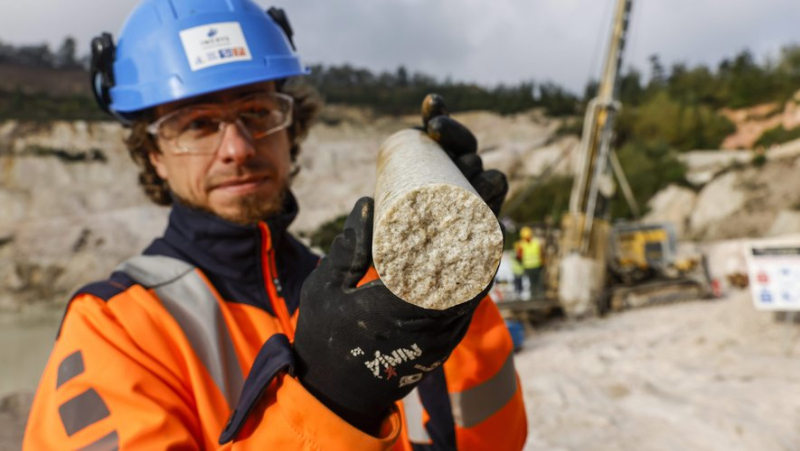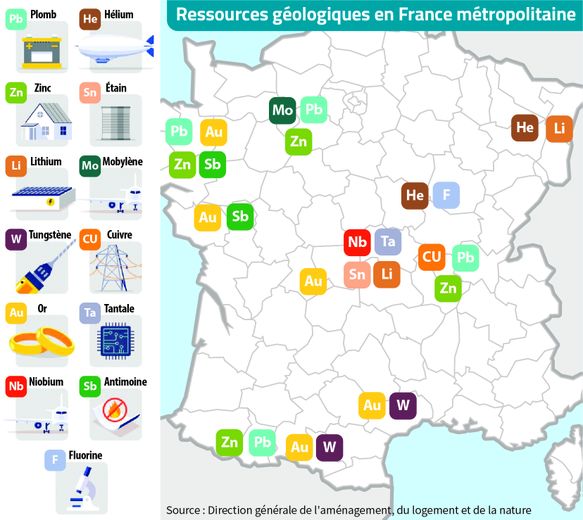CASE. Lithium, gallium, tantalum… when France is re-interested in the mineral wealth of its subsoil

Imerys a trouvé à Beauvoir, dans l'Allier, du lithium dans du granite. En très grande quantité. MAXPPP – Olivier Corsan
Les tensions géopolitiques et la concurrence sur les matières premières exigées par la transition écologique et numérique de l’économie et de la société pourraient conduire à rouvrir des mines, rechercher des minéraux devenus stratégiques.
Salt, bauxite, bituminous limestones, tin, tantalum, niobium in mainland France, gold in Guyana, nickel in New Caledonia: the mines have not completely disappeared from French soil, with the closure of Creutzwald in 2004, by Charbonnages de France. The last coal pit.

Metals available in France and their applications in the contemporary economy. FREE MIDI – Antoine Llop
It is not necessary, moreover, to go very far. In Hérault, in Villeveyrac, the extracted bauxite goes to the manufacture of cement; the rock salt of Parrapon, in Vauvert (Gard) at a depth of 3,000 m, to that of PVC. These two farms continue to exist in Occitania which has known them in the past, specifies Dreal, the Regional Directorate for the Environment, Development, Housing, "more of 400", coal, uranium, "iron, lead, zinc, gold, silver, tungsten". She still bears the traces, even painful stigmata.
This French mining history, very far from these heydays, could well experience an unexpected rebound, in a context of geopolitical tensions and exacerbated competition between states over "the mining resources which are necessary to the energy transition", emphasized Emmanuel Macron on September 25, 2023. Which required a "large inventory" of national soil, "to secure this sovereignty of our raw materials".
71.30 M€ for science
France, as a result, is re-interested in its subsoil. Its energy potential to move away from fossil fuels, its mining potential to fuel the development of a new digital, carbon-free industry, demanding metals that are sometimes rare, strategic or critical, this qualifier linked to their complicated supply. Let us cite two, cobalt and lithium, which are absolutely needed in the construction of electric automobiles. However, the national subsoil is rich.
On a map from BRGM, author of an atlas published at the end of 2021, 24 different substances appear. Extraction permits have already been granted, for lithium in Beauvoir (Allier), in particular, exploration permits also, for white hydrogen in Béarn for example, at the end of November.
But to go further, we need to better understand this potential, future needs. To evaluate the conflicts that its exploitation may induce, "to address a certain number of research questions, says Pierre Nehlig, geologist at the BRGM, in Orléans. Need for operating and use scenarios, to work on less polluting, innovative technologies, to address questions related to environmental impacts, legal and social aspects", lists the scientist again.
For this, the State has released a budget of 71.30 million euros as part of the France 2030 plan, allocated to a PEPR entitled Basement, common good, launched on February 13.
The State has not decided anything
PEPR, "the acronym for priority research program, deciphers Pierre Nehlig, its co-director. What we are talking about is the intersection between solid earth and human activities. Basically, 5 km below the superficial part."
This program will focus on eight themes and five geographical projects: the Rhine divide (geothermal energy), the Paris basins (urban infrastructure) and Aquitain (hydrogen, C02 storage), Guyana (mineral resources) and the Massif Central (mineral resources, geothermal energy). This last section goes down to Occitania and is carried out by two Toulouse co-leaders, the sociologist Sylvia Becerra (CNRS) and the geologist Olivier Vanderharghe, from Paul-Sabatier University.
No need to be a great cleric, however, to imagine that the prospect of reopening mines in mainland France would hardly enthuse the population. "We are very far from it, tempers Xavier Arnaud de Sartre, geographer at the University of Pau, other co-director of the PEPR. The State has not decided to exploit the French subsoil, it is paying to see if it would be possible. There is a more or less exploitable potential, exploitation technologies causing more or less damage, trade-offs to be made according to operating costs and it is rather these elements that we will give: the conditions for arbitration on the use or not of the subsoil." Answers in 2030.
“We want a democratic debate”
Technological, the PEPR Basement approach is also done through "the human sciences, points out Olivier Vidal, from the CNRS, researcher in Earth sciences. By questioning people about how they see the future, what the basement represents for them ", what they want to do with it. These responses will be integrated into the scenarios submitted to the State.
The third co-director of the PEPR also dismisses the idea of acceptability, which "supposes that we already have a project in mind and that’s ;we ask people if they accept it". "Our idea is to ensure that the projects that reach the end are acceptable", continues Xavier Arnaud de Sartre, because’ we will have "asked the question of populations" before that.
Each of the eight components and five projects is thus characterized by its interdisciplinarity. The Massif central project, launched in June, is co-directed by Olivier Vanderhaeghe, geologist, and Sylvia Becerra, sociologist of environment and risks, both researchers at Toulouse 3 University. – common good ground also owes nothing to chance, she notes. "It’is a safeguard, on the fact that it is not just a resource and that the economic aspect should not alone define it. We cannot do without social issues."
Both thus have the ambition, in these six years, "to identify and understand the geological and sociological levers and locks of the future of the basement" on various sites in the Massif Central chosen for their supposed extraction potential and their interest in terms of human sciences and social issues. "We want a democratic debate, which does not exist on land exploitation."
At the Montpellier cluster, researcher Bénédicte Cenki also promotes this vision, adding the pollution and remediation aspects: "It really is necessary that all stakeholders are there at the start."
I subscribe to read more




